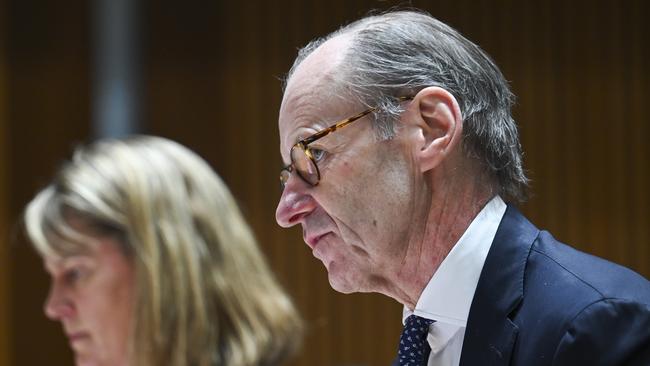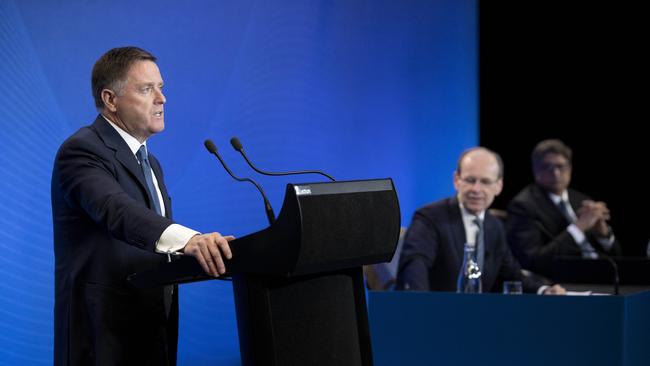ANZ CEO Shayne Elliott loses $1.1m after markets scandal
The lending major also revealed it sacked 88 staff last year for breaching the bank’s code of conduct.

The lingering scandal over ANZ’s markets business and a move by the prudential regulator to impose a $250m capital penalty and order a cultural review has cost the bank’s senior leadership millions of dollars.
In the wake of unveiling its $6.7bn full-year profit, ANZ revealed the scandal surrounding the bank’s markets business had cost chief executive Shayne Elliott $1.1m, after his bonus was docked by 46 per cent.
The Australian Securities & Investments Commission is currently investigating ANZ over its role in a $14bn government bond deal and the data it supplied.
According to the bank’s annual report, Mr Elliot’s short-term incentives were slashed to $1.3m after a $2.4m reward last year.
Several other executives also saw their incentives cut.
ANZ’s institutional bank boss Mark Whelan was handed just $595,000 in the wake of the markets scandal, with his bonus slashed by 60 per cent.
Mr Whelan, who has oversight of the ANZ’s markets business, banked a $1.46m bonus last year.
On average ANZ executives’ bonuses were docked 29 per cent due to problems in the markets business.

Detailing its response to the scandal, ANZ’s board revealed it had established a subcommittee to deal with the markets business, led by chairman Paul O’Sullivan.
ANZ revealed the board “spent considerable time deliberating remuneration outcomes for the CEO and disclosed executives, taking into consideration the findings from the accountability reviews, and the fact that the executive committee have collective accountability for the performance of the bank”.
The bank revealed it had reduced its “risk modifier”, slashing the outcome of the group scorecard and affected variable remuneration for all staff.
ANZ also reduced short term vesting rights for the bank’s executive committee and 2025 long-term variable remuneration restricted rights, set to be granted in November and December.
Incentives were docked even further for executives with oversight of the markets division and its non-financial risk matters.
But ANZ decided to grant 90 per cent of the long-term vesting rights to executives for 2025, noting that although the bank did not meet its risk measures, almost all the $3.2m in rights could be awarded.
ANZ’s board warned “as investigations into the matters above are ongoing, the board view is that there is sufficient deferred remuneration on-foot to apply downward adjustment should further information come to light that justifies the application of additional consequences”.
The Australian Prudential Regulation Authority has ordered ANZ to bring in external consultants from Oliver Wyman to examine the bank’s markets business, in the wake of handing ANZ a $250m capital penalty.
Mr Elliott said this review was global and would not be confined to the Sydney dealing room.
He told The Australian ANZ New Zealand general counsel David Bricklebank was assisting the bank’s review, noting the lawyer “has the right set of skills and capability”.
As revealed in The Australian, Mr Elliott spent 13 and a half minutes apologising to the Australian Office of Financial Management over an ill-fated $14bn bond placement, for which the bank was risk manager.
Mr Elliott told media the bond trading issue was “very serious”, noting he had “never diminished the seriousness of it”.
ANZ’s annual report showed the bank examined 1400 employees in the year for alleged breaches of its code of conduct.
Of these, 488 cases saw staff face formal consequences or depart the bank.
This included 188 staff found to have engaged in unacceptable behaviour as well as a further 27 found to have committed fraud or theft.
ANZ revealed 88 staff were terminated in the period, while another 94 left the bank in response to findings against them.






To join the conversation, please log in. Don't have an account? Register
Join the conversation, you are commenting as Logout